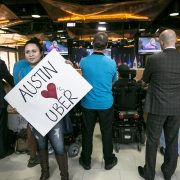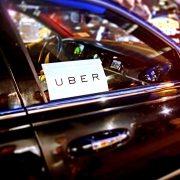California may have just passed a death sentence on the gig economy.
Late Tuesday night, as many California residents slept in their beds, the state legislature passed a bill that is expected to impact hundreds of thousands of independent contractors across the state.
For months now, the state assembly has been debating controversial legislation seeking to redefine how companies classify independent contractors. Directed at the gig economy, which is comprised of mainly contractors, Assembly Bill 5 (AB5) proposed changing the status of workers within the state from freelancers to actual employees—completely changing the model of the burgeoning sector. In 2017, 55 million people, or more than 35 percent of the US workforce, were participants in the gig economy.
Major gig economy participants Lyft and Uber spent a fair amount of money trying to fight this legislation, but to no avail. It passed with a vote of 29-11 and is expected to be signed by Gov. Gavin Newsom soon—putting the future of California’s gig economy in question, if not the entire country.
The Gig Economy Exists for a Reason
Over the last several years, the gig economy has grown significantly across the country. According to the Bureau of Labor Statistics (BLS), in 2017, 55 million people, or more than 35 percent of the US workforce, were participants in the gig economy. By 2020, that number is expected to jump to 43 percent.
These numbers should serve to prove just how popular the gig economy is with both workers and consumers, but California labor activists are concerned that gig workers are being treated differently from most employees. In a sense, they are not wrong, because when it comes to the gig economy’s unique model, “employee” takes on a different meaning than it does in other sectors. But this isn’t necessarily a negative.
You might ask yourself what makes the gig economy appealing to workers. The answer is simple: freedom and flexibility.
As a traditional full-time employee, most are required to work a certain amount of hours for their employer each week—usually during specified office hours. If work needs to be missed for some reason, your employer will usually give workers a set amount of sick or vacation days to use at their disposal.
In exchange for your work, your employer may offer you other benefits, but there are also “protections” that come with this official “employee” status. Worker “protections” that fall under the Fair Labor Standards Act, Americans with Disabilities Act, or the Civil Rights Act are meant for employees, not contractors. The same is true with minimum wage, overtime pay, health insurance, and unemployment insurance.
All this considered, you might ask yourself what makes the gig economy appealing to workers. The answer is simple: freedom and flexibility.
Contracting vs. Employment
An Uber driver does not punch a clock, nor does he or she subscribe to any set work schedule. Instead, gig economy workers are free to work, or not work, whenever they choose. If you wake up and decide you want to go on vacation, you can. You don’t need to call your boss or use your vacation days, you just choose not to work that day.
This flexible arrangement has proven popular, especially with young workers. And it has given many Americans a chance to better their lives by allowing them to supplement their incomes whenever they can.
A recent college grad earning $40k a year may quickly discover this isn’t enough to cover rent, living expenses, or student loan payments in California. However, since driving for Lyft or Uber allows you to make your own schedule, many are able to work during the day and drive a few hours at night while being able to pay all their bills.
The state of California has presumed to understand the wants and needs of each gig economy worker through the passage of AB5 and the entire gig economy may suffer as a result.
This flexibility and income are precisely why so many people have been eager to participate in the gig economy, even if that means giving up other benefits offered in traditional employee/employer settings. Sure, someone looking to make a few extra bucks could get a part-time job, but that would still involve coordinating schedules and being required to work a set amount of hours.
This just isn’t feasible for everyone, nor is it desirable. Plus, most jobs have a lengthy hiring process, but for those needing additional income now, the gig economy lets them onboard quickly and get right to work.
Ultimately, these gig economy workers have made the choice to forgo these employee “perks,” because they believed the benefits of the gig economy outweigh any potential negatives. And it is their right to do so.
Yet, despite this being a personal decision that should be made by each individual, the state of California has presumed to understand the wants and needs of each gig economy worker through the passage of AB5. And the entire gig economy may suffer as a result.
A Different Landscape
If, but most likely when, Gov. Newsom signs the bill into law, the gig economy is going to look quite different in California. For starters, each company will have to apply the “ABC test” to determine a worker’s status.
In 2018, the California Supreme Court handed down its ruling in the case of Dynamex Operations West, Inc. v. Superior Court of Los Angeles. The ruling, now known as the “Dynamex decision,” dealt with the employment status issue of contracted delivery drivers and instituted the “ABC test” as a means of determining whether or not a person is an employee or a contractor.
The ABC test specifies that a contractor must be:
- (A) that the worker is free from the control and direction of the hirer in connection with the performance of the work, both under the contract for the performance of such work
- (B) that the worker performs work that is outside the usual course of the hiring entity’s business
- (C) that the worker is customarily engaged in an independently established trade, occupation, or business of the same nature as the work performed for the hiring entity
If a worker does not explicitly meet this rather broad set of criteria, they are considered an employee, not a contractor. This means that companies like TaskRabbit, DoorDash, Uber, and Lyft will have to treat these individuals as employees, offering them minimum wage, benefits, and all the perks that go along with it.
The gig economy was never meant to be a traditional sector, so treating it as such belittles what it actually is. In fact, much of the reason it has been so profitable for all involved is because its model is brilliant.
Now that one state has committed to essentially dismantle the gig economy, it is likely that others will follow suit.
With Uber, for example, the cars are owned by the contractors, saving Uber overhead costs of buying property. And since these drivers are willing to trade traditional worker benefits for the freedom to earn money whenever they want, Uber has also been able to cut costs and give more people the opportunity to supplement their income.
But when AB5 goes into effect, which could take a while given how it completely upturns the sector, these companies will suddenly be left with costs for which they never planned. For many, these costs will be impossible to afford and could signal their end. And with fewer gig economy options available to workers, that means less financial opportunities for would-be hardworking Californians.
In anticipation of the new law, Uber has already had to cut hundreds of employees in a massive layoff. When the law goes into effect, it will only get worse.
An Isolated Incident?
Hopefully, other states won’t use California as an excuse to implement similar policies, but therein lies the real danger with AB5. Now that one state has committed to essentially dismantle the gig economy, it is likely that others will follow suit.
California legislators may think they are protecting workers, but their actions will have the opposite effect. Each person should be allowed to decide the nature of their relationship with an employer. If you want to take the traditional route, that’s your prerogative. The same is true if you choose to participate in the gig economy.













